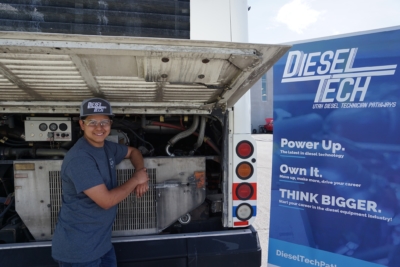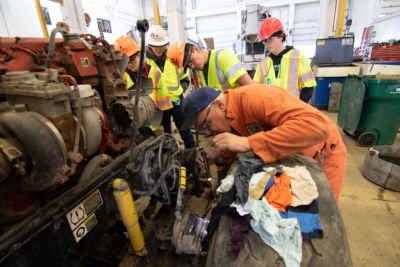 The Utah Diesel Tech Pathways (UDTP) was formed in 2017 by the Governor’s Office of Economic Development (GOED) to create a partnership with Salt Lake Community College, Jordan and Canyons School Districts and local industry partners. The pathway was formed to expand and cultivate the talent pipeline for the diesel tech industry — an industry in high demand and vital to economic growth and development in Utah.
The Utah Diesel Tech Pathways (UDTP) was formed in 2017 by the Governor’s Office of Economic Development (GOED) to create a partnership with Salt Lake Community College, Jordan and Canyons School Districts and local industry partners. The pathway was formed to expand and cultivate the talent pipeline for the diesel tech industry — an industry in high demand and vital to economic growth and development in Utah.
Salt Lake County piloted the program, creating a pathway for secondary students to take two diesel courses at the local technology center. The courses offered concurrent enrollment credit at Salt Lake Community College. Students could then continue their pathway with that college to earn an associate degree. Secondary and postsecondary students, alike, participated in job shadows and internships to gain further knowledge of the field.
Because things were so successful in Salt Lake County, the Governor expanded UDTP into Utah County for 2018–19. (The program has since grown to include 12 school districts, seven higher education partners and more than 100 industry partners.) Grant funding from GOED helped Utah County create, upgrade and market the diesel tech pathway. Now, two years later, two new diesel shops are being built in Utah County — increasing its capacity to support pathway completers. Students in many counties have two options:
- They can go to the technical college, which usually offers free or low-cost tuition.
- Or, they can start on the pathway through concurrent enrollment
Many regions in Utah now offer both options as we have almost half the state involved in the pathway.
Support for a diesel tech career pathway
Utah has seen very steady growth in expansion to different regions in the state. We started with just one region four years ago. And each year has added another state CTE region to the map — up to five. Within 12 participating school districts, there are more than 30 individual schools.
Consider how one Murray, Utah, company — Geneva Rock — best serves their employees to support and maintain a qualified workforce.
 Twice a year, Geneva Rock awards a $2,000 scholarship for students currently enrolled in an accredited university, college, trade or vocational school in the pursuit of a construction-related career.
Twice a year, Geneva Rock awards a $2,000 scholarship for students currently enrolled in an accredited university, college, trade or vocational school in the pursuit of a construction-related career.
Geneva Rock offers benefits — including paid time off, dental, vision, health and pension. Entry-level employees at Geneva Rock — shop oiler/oiler intern — earn $22.82 per hour to start and increase to $26.85 per hour after an introductory period.
As they grow in skill and experience the salary increases to reflect that growth. The highest paying diesel mechanic — the journeyman/field mechanic — earns $29.44 per hour. Other opportunities for growth include into roles such as assistant shop supervisor, shop foreman and area equipment superintendent.
Valued industry partners play pivotal role.
Industry support has been key in the development of Utah Diesel Tech Pathways program. When UDTP first began, six companies came together with education stakeholders to combat the shortage of diesel technicians in Utah. These companies were:
- Cummins Rocky Mountain
- Jackson Group Peterbilt
- Kenworth Sales Company
- Komatsu Equipment Corporation
- Mountain West Truck Center Volvo Mack
- Wheeler Cat
Valued industry partners provided school districts with the newest technology for students to learn and train on. They provided job shadows, internships, and the opportunity to interview for employment. They visited shops to talk to students, teachers and work-based learning coordinators — leading tours, creating regional advisory boards.
 Working under the UDTP, under one singular logo, diesel tech companies showcase an understand of a common need. They all need technicians, and they must work together.
Working under the UDTP, under one singular logo, diesel tech companies showcase an understand of a common need. They all need technicians, and they must work together.
Stakeholders from industry and education work together to make a fluid pathway with stackable credentials. Students become lifelong learners, to grow with the industry and into the jobs of tomorrow.
UDTP most recently expanded into southern Utah, in December 2019, and gained new industry partners in Walmart, Snap-on and Napa Auto Parts among others. These big-name companies are constantly looking for technicians to keep their fleet of trucks and machinery up and running. Without those technicians, there would be more accidents with semi-trucks; our delivered goods would be late. Construction and mining may come to a halt. Diesel technicians help keep our economy going. It is critical that students and their families become aware of the possibilities available to them in CTE.
Schools educate tomorrow’s workforce.
Educators in Utah created brand new concurrent enrollment courses to fit the industry need in their area; they participated in advisory boards and events to create and promote the pathway. Currently, students across the state can complete two concurrent enrollment courses in Basic Diesel Theory and Engine Performance. Both courses incorporate safety components. Credit for  concurrent enrollment courses stack into a one-year certificate or a two-year associate degree.
concurrent enrollment courses stack into a one-year certificate or a two-year associate degree.
Students can also choose to begin the UDTP at their local technical college. From there they can choose to take on employment or continue their postsecondary education at a local university where an articulation agreement has been signed.
Each institution has worked with their local partner to create these agreements, an effort that is now expanding into other regions. This will create more opportunities for students who may want to move to another part of the state or are transferred by their company but want to continue their education. Secondary and postsecondary schools have all come to the table to create a seamless pathway — to meet the needs of students and the local economy.
Students experience life-changing postsecondary transitions.
For students, UDTP presents a chance to explore education outside the traditional four-year degree pathway. They can start in a paid or unpaid internship at 16. They can start their training while they are still in high school. Note: The program also extends to adults looking for more training, or for a shift in their career:
“Clinton resident Andrew Huddleston, 35, joined the diesel pathways program after trying numerous other career options. He said finding the diesel program was a life-changing discovery.
“I’m more of a hands-on person,” he said. “I like to get in and get my hands dirty.
“(Diesel trucking) is the lifeblood of this country,” he said. “I love doing technician work. The program gives me a leg up on everyone else.” (Lee, 2019)
Many of Utah’s technical colleges offered diesel technology programs, but the pathway really  opened the door to industry. UDTP gives students the opportunity to interact with multiple companies in their area. They are able to make informed decisions about training for future careers.
opened the door to industry. UDTP gives students the opportunity to interact with multiple companies in their area. They are able to make informed decisions about training for future careers.
Furthermore, many companies have begun offering scholarship opportunities for students of all ages to help them gain the proper tools, training and experience. These scholarships are vital to ensure diversity of access for students of all socioeconomic backgrounds.
Conclusion
The Utah Diesel Tech Pathway creates unique opportunities for businesses to increase their talent pipeline and provide rewarding careers for students. Education and industry stakeholders came together to meet a common goal of rendering successful postsecondary transitions for students, no matter where they go for training. And they are now beginning to reap the benefits — with a growing pipeline of potential employees from across the state of Utah.
Torrie Costantino is the CTE pathways coordinator at Utah Valley University. Costantino was a 2019–2020 fellow of the Postsecondary Leadership Success Program at ACTE – Sponsored by ECMC Foundation. She is intensely passionate about CTE and improving the world of education for all students. Email her.





